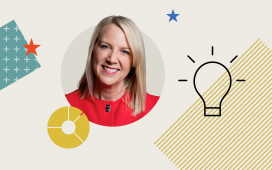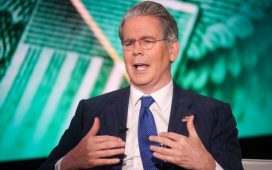- Hein Schumacher will stop ‘force-fitting’ social justice messaging onto brands
- He said brands taking political stances can be an ‘unwelcome distraction’
- Some investors have urged Unilever to ditch ‘virtue signalling’
Unilever has given the clearest hint yet that it will dial down its ‘woke’ agenda as its unveiling of a turnaround plan underwhelmed investors.
Hein Schumacher, who took over from Alan Jope in July, said he would stop ‘force-fitting’ social justice messaging onto brands.
He said brands taking political stances can be an ‘unwelcome distraction’.
Some investors have urged the consumer goods giant to ditch ‘virtue signalling’ and focus on the bottom line.
Jope put social purpose at the centre of the Hellmann’s mayonnaise maker’s strategy, pledging to sell brands that ‘are not able to stand for something more important than just making your hair shiny, your skin soft, your clothes whiter or your food tastier’.

Schumacher said a social cause was critical to marketing some brands, but for others it was a ‘distraction’, adding: ‘Not every brand should have a social or environmental purpose. We don’t want to force-fit that on brands unnecessarily.’
Last year, Unilever was blasted by investor Terry Smith for ‘ludicrous’ virtue-signalling on everything from sustainability to Knorr stock cubes. There will be a ‘dialling back’ on social messaging in a focus on growth, Sophie Lund-Yates, equity analyst at Hargreaves Lansdown explained.
But investors were underwhelmed. There had been high hopes for Schumacher but shares in the British firm whose brands include Dove soap and Magnum ice cream fell 2.8 per cent, or 113.5p, to 3900p.
Schumacher’s strategy will focus on 30 ‘power’ brands which make up 70 per cent of Unilever’s turnover. These include staples such as Dove, Vaseline and Ben & Jerry’s.

New direction: Hein Schumacher
But the City reaction was muted, with analysts saying the update failed to ‘blow our socks off’. A share dip yesterday compounded a 12 per cent tumble over the past six months. AJ Bell analyst Danni Hewson said: ‘It is not enough to get the market excited, particularly when combined with the mixed third-quarter numbers.’
In its third-quarter results, Unilever posted a 5.2 per cent rise in sales, boosted by price increases. But volumes were down 0.6 per cent, with Europe taking a hit of 10.7 per cent.
Responding to City sceptics, Schumacher pledged: ‘We can make a difference. It’s making sure we are aware of the things that need to change.’
Unilever’s first move is to sell shaving and grooming business Dollar Shave Club to US private equity giant Nexus. Although the news that he would succeed Alan Jope was a surprise to those expecting a big name from the consumer world, Schumacher’s record shows he is ruthless.
At Dutch dairy co-operative FrieslandCampina, he carried out a restructuring that involved asset disposals, factory closures and job cuts.









